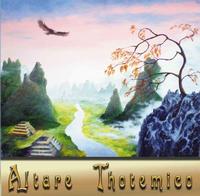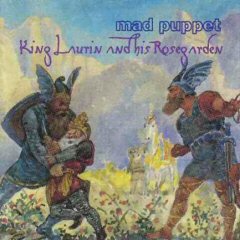Accordo dei Contrari come from Bologna and began life in 2001 on the initiative of Cristian Franchi (drums), Giovanni Parmeggiani (keyboards) and Alessandro Pedrini (guitar). After many years of hard work and some line up changes, in 2007 they released an excellent debut album, Kinesis, on the independent label AltrOck with a line up featuring Cristian Franchi (drums), Giovanni Parmeggiani (keyboards), Daniele Piccinini (bass) and Marco Marzo (guitar) plus two guest musicians, Fabio Berti (violin) and Giorgio Trefiletti (sax). The band’s influences range from progressive rock and jazz-rock from the seventies to contemporary jazz and classical music but the final mix is surprisingly fresh and rich in ideas. The album is completely instrumental but the beautiful art work by Davide Guidoni and the words written by the band to comment the album tracks provide an interpretation for the sparkling music that flows away without weak moments for about 45 minutes.
The opener “Lester” is named after the American music journalist Lester Bangs and marks the beginning of a musical journey. After the first uncertain steps the pace becomes steady and full of vitality with the electric guitar in the forefront backed by pulsing bass lines. The following “Meghiste Kinesis” is darker and tense. According to the liner notes it tries to evoke the ghastly dance of an impending, unprovoked war. A man observes a threatening fleet approaching the coastline and the landing of a formidable army ready to fight...
“ScalaQuadro” is complex and full of musical colours. According to the liner notes it tries to describe the Muses climbing up a stairway to reach the top of a tower, ready to jump in the void for an extreme sacrifice. It's my favourite track on this album and features tense, hypnotic electric guitar riffs and a powerful crescendo with frenzied keyboard patterns. A calmer piano solo finale leads to the following “Gondwana”, a musical evocation in four movements of the irresistible force of the continental drift and of the ties between East and West.
“Anexelenkton” is another excellent track that tries to break the barriers between different genres. The last track, “OM”, is dedicated to the French organist and composer Olivier Messiaen and according to the liner notes consists of visionary apparitions and prepared concern. A perfect conclusion for a very good album!
Accordo dei Contrari: Kinesis (2007). Other opinions:
Assaf Vestin: For a great thrill of an album; an album that mixes fusion with prog-rock characteristics of the past and present; for good musicianship; for a rich and enveloping sound; for a well-balanced mix of melody and technicality - this album will satisfy your needs and more... (read the complete review HERE).
Vitaly Menshikov: “Kinesis” by ADC is a true ensemble effort by accomplished musicians, all of whom play with great mastery and expressivity, but never showcase their strong technical skill just for the sake of it. How did they manage to reach such a high level already with their first release? I’ll leave to you, dear readers, to arrive at a conclusion, though I’m sure your verdict will be favorable in any event... (read the complete review HERE).
You can listen in streaming to the complete album HERE
In 2011 Accordo dei Contrari released an excellent sophomore album “Kublai”, confirming all the good promises of their debut. The line up is the same as in the previous work with two prestigious guests on one track, Richard Sinclair (vocals) and Antonio “Cooper” Cupertino (percussion). According to the band, Kublai represents ordered chaos, light and dark, the balance between written and improvised music.
The lively, jazzy opener “G.B. Evidence” is freely taken from a theme by Thelonious Monk. The band “prog” interpretation is absolutely convincing, full of energy with delightful keyboards rides alternating with frenzied electric guitar passages backed by a nervous rhythm section. Next comes “Arabesque”, a long, complex track that recalls Area and features many Oriental influences. It's my favourite on this album, it starts softly and takes you far away for a long trip where you can smell spices and taste exotic fruits. The following “Dark Magus” begins with the sound of a gong that, according to the band, marks the passage from the visible to the invisible. The atmosphere is tense, full of evocative passages where guitar and organ paint in chiaroscuro on their musical canvas.
“L'ombra di un sogno” (Shadow of a dream) features Richard Sinclair on vocals. Richard Sinclair wrote the lyrics for this piece as well, a charming elegy for a lost companion, his beloved, faithful dog. Dreamy memories shine through this melancholic song of intense beauty. “Più limpida e chiara di ogni impressione vissuta part I” (Clearer, brighter than any lived impression) is more aggressive and according to the band tries to describe the hopes and fears of everyone's life while the last track “Battery Park” was inspired by the gentle flow of the Hudson river on a windy and sunny day in February 2007 in New York City. Here gentle piano touches contrast with the thundering force of some guitar riffs in an effective way. Well, a perfect conclusion for a wonderful album!
Accordo dei Contrari: Kublai (2011). Other opinions:
Raffaella Benvenuto-Berry: A perfect marriage of formal elegance and emotion, rich with diverse influences but always cohesive, Kublai clearly proves that Accordo dei Contrari are ready to take their rightful place alongside D.F.A. as purveyors of impeccably executed, yet warm and emotional jazz-rock in which keyboards play a prominent role. The band have amply fulfilled the promise shown by their debut, Kinesis, and the compositional and technical maturity shown on their sophomore effort bodes extremely well for their future career. A must for fans of the Canterbury scene and classic jazz-rock in general, Kublai will delight anyone who loves great music – whatever the label attached to it... (read the complete review HERE).
More info:












